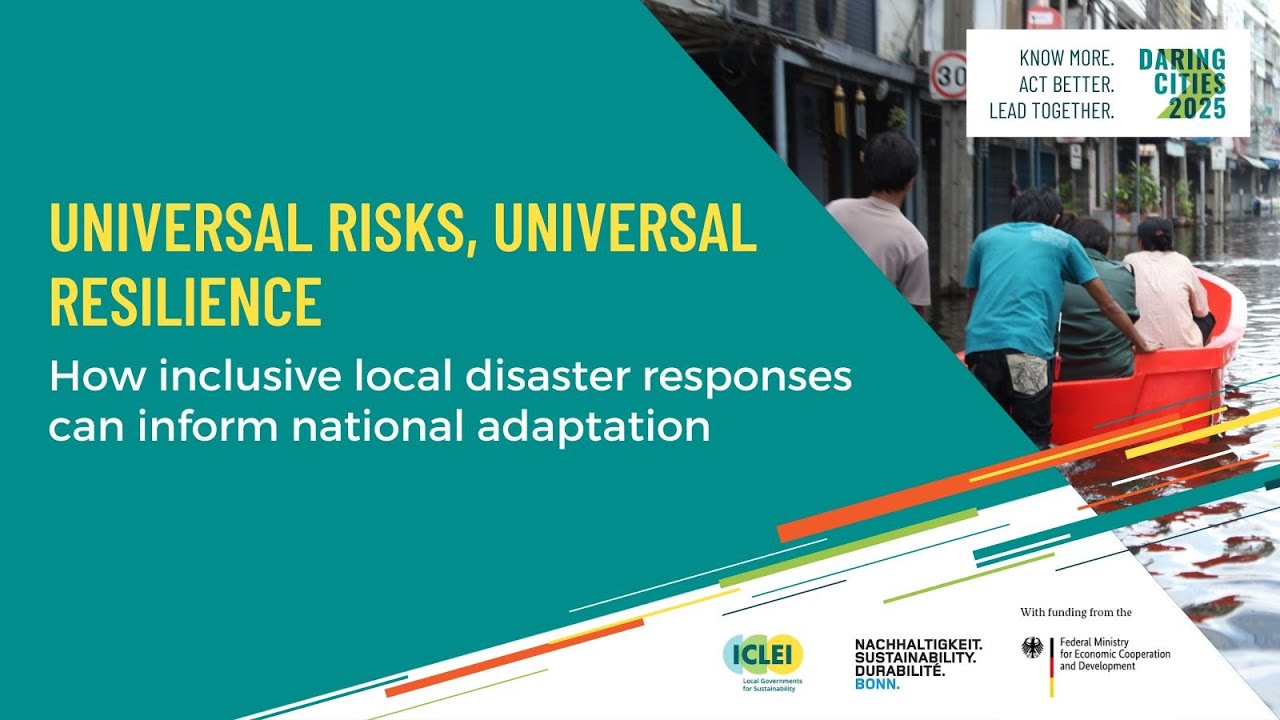Local community-led resilience efforts from Asia take center stage at Daring Cities 2025
/
Over 200 participants from across the globe joined the Daring Cities 2025 Virtual Forum session “Universal Risks, Universal Resilience: How Inclusive Local Disaster Responses Can Inform National Adaptation” on 7 August 2025, spotlighting how community-driven disaster resilience efforts can strengthen national climate strategies.
The 90-minute panel featured local and national perspectives from Bangladesh, Indonesia, Nepal, and the Philippines. Moderated by Mae Valdez-Irong, ICLEI Southeast Asia Regional Program Manager, the event showcased local best practices in inclusive disaster risk reduction (DRR) and discussed the challenges and solutions for aligning local and national resilience plans.
It was jointly organized by ICLEI Southeast Asia and ICLEI South Asia and saw attendees from local and national governments, intergovernmental organizations, the private sector, academia, and civil society from all over the world.
Communities at the core of resilience

Panelists all underscored that resilience strategies must be built with—and led by—communities. Dr. H. Aminuddin, Mayor of Probolinggo City, Indonesia, shared how the city supports grassroots-led initiatives such as mangrove restoration at Permata Beach and the “Gotku Resik” clean-city movement. Both initiatives have become embedded in local habits, boosting eco-tourism, strengthening livelihoods, and reducing flood risks.
From the Philippines, Mayor Jose Ivan Dayan Agda of Borongan City shared how forest protection programs employ former insurgents, including women, as forest rangers—combining nature-based solutions against typhoons, flashfloods, and landslides, with inclusive livelihood creation.
Meanwhile, Ranver Ahmad, Town Planner for Bangladesh’s Kushtia Municipality, highlighted a public–private partnership model for solid waste management that strengthens resilience while creating green livelihoods by improving the value chain of waste. As an example, Kushtia’s waste management system has developed a composting service that benefits both the immediate communities and its agricultural sector.
In Nepal, Srijan Gadal, the Head of the Suryodaya Municipality Department of Urban Development, described a two-way feedback mechanism between citizens and local government, ensuring household-level involvement in resilience planning in particular, and overall municipal development in general.
From the national perspective, Dr. Raditya Jati, Deputy Minister of Systems and Strategy at Indonesia’s National Disaster Management Agency, stressed the importance of breaking down silos between DRR, climate change, and the Sustainable Development Goals (SDGs). Programs like the Indonesia Climate Village and Subdistrict Resilience initiatives, along with a national pooling fund, aim to mobilize communities and invest directly in local resilience through thematic areas such as waste management, urban farming, and rainwater harvesting, among others.
Dr. Nurun Nahar, Additional Secretary of the Planning Division at the Bangladesh Planning Commission, described how the country’s ministries collect, refine, and scale local best practices through research and information and communications technologies (ICTs) like the Disaster and Climate Risk Information Platform (DRIP), which provides spatial risk data for integrated climate and disaster planning.
Shared challenges and ways forward

While the showcased initiatives demonstrated diverse entry points to inclusive multi-level resilience, panelists identified common barriers. These include limited technical capacity at the local level, inadequate funding, fragmented coordination, siloed planning processes, and significant local data gaps.
The discussion yielded several recommendations to address these challenges. These include: strengthening policy coherence between national and local levels with clear monitoring frameworks; building local capacity to translate national strategies into actionable, context-specific plans; improve mechanisms for data sharing and utilization; and developing innovative financing models tailored for local resilience needs.
Enhancing socially-inclusive resilience in Asia and beyond
The session demonstrated that inclusive, community-centric resilience efforts are not just local success stories but are building blocks for stronger national adaptation efforts. The exchange of experiences during the forum reinforced a key message: empowering communities to lead is essential for building resilience that lasts.
The local government and national government panelists are currently being engaged by ICLEI Southeast Asia and ICLEI South Asia through the Climate Adaptation and Resilience (CLARE) programme-funded Enhancing Local Capacities in Socially Inclusive Resilience in Asia (SIRA) project.
Now in its sixth year, Daring Cities—launched by ICLEI and the Federal City of Bonn, Germany—aims to empower local leaders to address the climate emergency through knowledge exchange. This year’s theme, “Stronger national climate plans through multilevel action,” underscores the importance of aligning local and national climate strategies. More information about Daring Cities is available via https://daringcities.org/.
A replay of this session, along with other sessions in this year’s Daring Cities 2025 Virtual Forum is available on the Daring Cities YouTube page.
Categories
Countries
CLARE Pillars
CLARE Themes
CLARE Topics
Published
CLARE Projects
CLARE Partners


